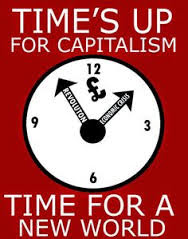We may be facing a stark choice: a socialist world or no world at all.
Green capitalism is just as much a pipedream as ethical capitalism or, as we have been saying for ages, capitalism reformed to benefit the workers. The only possible capitalism is the one we’ve got: a profit-maximising one. Capitalism is not sustainable by its very nature. It is predicated on the expansion of markets, higher consumption and increased production. Corporations will seek out loopholes in every law and regulation that seeks to constrain their business profits and dividends to investors.
Capitalism is the impersonal process of the accumulation of capital out of the surplus value produced by the wage working class and involves competition to transform this surplus value into money by selling the products in which it is embodied. This battle is won by those enterprises that can sell their products at the lowest price due to their employment of more productive methods. This investment in new productive methods depends on making enough profits (converting enough surplus value into money). So, capitalism is the pursuit of profits to accumulate as more capital. Such “growth” is built into it and cannot be stopped. If ever it was, the whole system would seize up and there’d be massive worldwide unemployment. All the arguments, whether or not they are expressed in terms of environmental considerations, must under capitalist conditions produce an answer in terms of profit margins.
The Socialist Party can clearly see that the system of production for profit is the major cause of pollution. It is capitalism that has forced CEOs to orchestrate and order the use of fossil fuels and the cutting down of tropical forests because this is cheaper and more competitive than the alternatives. What is required to stabilise the rise in temperature is a worldwide political and social revolution to end capitalism and put mankind in full charge of its interaction with the rest of nature (production). Which can only be done on the basis of the Earth’s natural and industrial resources becoming the common heritage of all humanity. We argue for the common ownership of the Earth’s productive resources, natural and industrial, by the whole of humanity, i.e. world socialism, for how could production be reoriented towards use instead of profit unless the means of production had first ceased to be the exclusive property of individuals, corporations or states? We don’t see why humanity has to wait till capitalism has nearly destroyed the planet to institute this. It could be implemented now, to avoid the further environmental degradation that will occur if capitalism continues.
Climate change is not just caused by “technology”, and a return to the “simple life” is no answer (though less passionate worship of "progress” might help). The high rate of technical innovation itself provides cures for its own disease. Dangerous substances can be totally discarded and replaced with chemicals which are more specific, or that break down more quickly. Non-chemical pesticide control can be developed. Factory chimneys can be capped and carbon capture. Sanitation can be fitted with more efficient filtration and with sewage recycled for fertilizer. Single-use plastics can be made redundant plastic can be developed. Industrial processes can all be modified where necessary. No technique of production is indispensable. There is a substitute for anything, or there soon can be if research resources are channelled in the appropriate direction. Something can be done about our environment, and of course, something to a limited degree is being done but the reasons for its slowness and indecisiveness, too late and too little, are economic, not technical.
Cigarette smoking, for example, provides profits for the tobacco firms and tax revenues for the state, yet intelligent administrators of capitalism can readily see that they lose out, because of the illness and death caused by cigarettes, which lower the productivity of the working class and thereby cut the rate of return on investments in labour-power (the Health Service, schools and universities, etc).
It is the same with pollution. Short-sighted people often talk as though the choice for capitalism was a concern for the environment or economic growth, but the truth is that in the long run, a lack of concern for the environment will cut growth by lowering the quality of human labour-power, the source of growth. Poisoned workers are not so profitable to employ. Furthermore, though government pollution-control laws raise the costs of production, firms do not necessarily mind their costs rising—so long as their competitors are in the same boat.
Not that socialists advocate an internationally mandated programme of regulation and control over capitalist businesses. What we want is for the production of the useful things that people need to live and enjoy life to be taken out of the hands of profit-seeking enterprises altogether. We want the means of production to be owned in common by the whole community as the only basis on which production can be organised to take account of the overall interest of all the members of society. In socialism there won’t be any profit-seeking capitalist enterprises to regulate; just democratically-run productive units producing, in an ecologically and socially acceptable way, what people need.


No comments:
Post a Comment